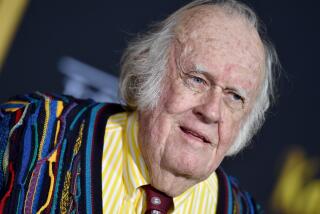Ex-Jurist to Head Iran-Contra Probe : Announcement of Lawrence Walsh as Independent Counsel Expected in Days
- Share via
WASHINGTON — Lawrence E. Walsh, a former federal judge, high Justice Department official and leader of the American Bar Assn., will be named independent counsel to investigate the Iran- contra arms deal that has rocked the Reagan Administration, a source familiar with the selection process said Saturday.
The announcement of Walsh’s appointment by a special three-judge court is expected later this week, subject to completion of a rigorous FBI security check to clear him for conducting an inquiry that will touch on highly classified and sensitive national security matters. In the interval, there also will be a review of Walsh’s legal record for possible conflict of interest.
Reached at his home in Oklahoma City, Walsh said: “I can’t comment at all.” The tall, graying former jurist, who will be 75 on Jan. 8, has been practicing law there since he left New York in 1981.
Walsh’s investigation will attempt to determine the facts in the secret operation in which arms were sold to Iran and some of the profits were diverted to assist anti-Sandinista rebels in Nicaragua.
To Recruit Assistants
Six independent counsels have previously been named to head investigations under the Ethics in Government Act of 1978 and they generally have been assisted by about four lawyers. But because of this inquiry’s complexity and the fast-growing list of individuals in and out of government who have had roles in the secret dealings it involves, Walsh is expected to recruit a larger group of lawyers to assist him.
The first report of Walsh’s selection for the tough assignment was aired Saturday evening by National Public Radio.
Walsh’s blend of extensive public service and private practice with Davis Polk & Wardwell, a leading Wall Street law firm, before his move to Oklahoma appeared to meet the unusual qualifications listed by Atty. Gen. Edwin Meese III when he asked a special court to appoint an independent counsel.
In his application to the three-judge court early this month, Meese said the counsel would need special qualifications to deal with questions “of unusual sensitivity, complexity and importance to the nation.”
Those qualifications included substantial knowledge and experience in “national security and defense, intelligence, counterterrorism, foreign aid and foreign military sales, as well as familiarity with the manner of execution of American foreign policy, the organization of the intelligence community and procedures relating to classification of information, privileges and authorizations.”
In addition to serving as a federal judge during the Administration of President Dwight D. Eisenhower and as the No. 2 man in the Justice Department under William P. Rogers, Eisenhower’s second attorney general, Walsh gained expertise in foreign affairs during a four-month stint in 1969 as deputy to Henry A. Kissinger during the Vietnam peace negotiations in Paris.
Walsh, a Democrat who often served under Republicans, is no stranger to controversy. In 1970, he headed the American Bar Assn.’s standing committee on the federal judiciary that approved President Richard M. Nixon’s controversial Supreme Court nominations of Judge Clement F. Haynsworth Jr. and G. Harrold Carswell. Both men were rejected by the Senate.
In 1975, Walsh served as president of the ABA, the nation’s largest lawyers’ organization.
Walsh, a native of Nova Scotia, entered government as a special assistant New York attorney general a year after his graduation from Columbia University Law School in 1935, and went on to become an assistant to Thomas E. Dewey, then New York City’s racket-busting district attorney. After Dewey’s election to the New York governorship, Walsh moved on to Albany as counsel to the governor.
The three judges who make up the special panel that names independent counsels are senior federal appellate judges. They are: George E. MacKinnon of Washington, Walter R. Mansfield of New York and Lewis R. Morgan of Atlanta.
Meese decided to apply for an independent counsel to avoid the appearance of conflict of interest that could result from a Justice Department investigation, and proposed that the outside prosecutor look into the shipment of arms to Iran and the resulting transfer of funds to the contras. After Walsh is formally named, the three-judge panel will detail the limits of his mandate.
Although President Reagan has pledged full cooperation with official efforts to lay out the facts in the matter, two of his former security aides have invoked their Fifth Amendment rights against possible self-incrimination in testifying before congressional committees. The two are Vice Adm. John M. Poindexter, who resigned as Reagan’s national security adviser when the Iran-contras link was first disclosed, and Marine Lt. Col. Oliver L. North, who was fired from the National Security Council staff.
In addition, Lt. Col. Robert Earl, North’s deputy, has invoked his Sixth Amendment right to effective counsel in also declining to testify.
Among the various ticklish matters Walsh will have to decide will be the question of whether to oppose congressional attempts to grant immunity from prosecution to Poindexter, North and other witnesses.
Walsh is likely to follow the precedent of the previous independent counsels in using the FBI to question witnesses and gather and obtain documents. The FBI investigation has been continuing “full-bore” while the special court searched for an independent counsel, according to FBI Director William H. Webster.
More to Read
Get the L.A. Times Politics newsletter
Deeply reported insights into legislation, politics and policy from Sacramento, Washington and beyond. In your inbox twice per week.
You may occasionally receive promotional content from the Los Angeles Times.










